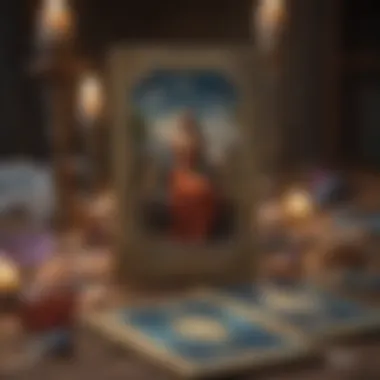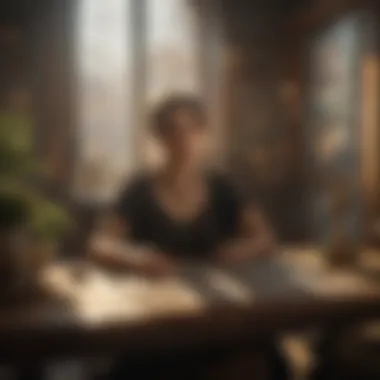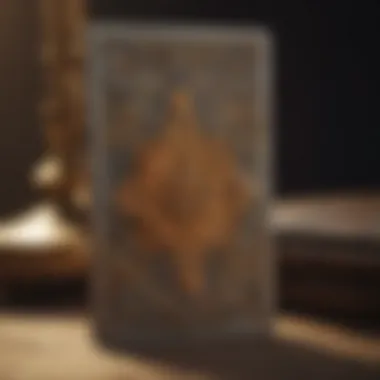Navigating Cancer Free Tarot Card Reading: A Comprehensive Guide


Intro
Understanding the intertwined realms of tarot reading and personal health, particularly in the area of cancer, offers a fresh perspective on self-discovery and emotional support. This guide intends to dissect the nuances through which tarot can function as not just a divination tool but also a medium for potential healing and psychic insight. The mechanics of each tarot reading can provide clarity amidst confusion, thus motivating individuals affected by cancer to explore their truths.
Characteristics of Each Zodiac Sign
Individual zodiac signs inherently embody specific traits that can influence the personal experiences of those affected by cancer. Understanding these traits may enhance insights gained through tarot readings, allowing for more personalized interpretations that align with individual circumstances.
Overview of Personality Traits
Each zodiac sign emanates distinct personality highlights that complement the emotional journey faced during health challenges. For instance:
- Aries embraces courage and determination, possibly leading to a heroic attitude in the face of adversity.
- Taurus, embodying stability and practicality, may feel grounded even when confronting health fluctuations.
- Gemini exemplifies adaptability and duality but may struggle to align emotions due to ongoing changes.
Strengths and Weaknesses
Recognizing both strengths and weaknesses can provide valuable insights for tarot interpretation. For example:
- Cancer has nurturing and empathetic traits which can bolster someone's resilience in a health crisis, yet may also invite emotional turmoil.
- Leo possesses a magnetic positivity but can fall into despair if faced with health concerns.
Compatibility with Other Signs
In tarot, the connections between signs can be informative. How different signs resonate with each other explains underlying emotional support systems, offering depth to the readings.
How to Interpret Tarot Cards
To effectively engage with tarot in support of emotional relief during cancer experiences, one must grasp the fundamental structures of tarot cards.
Major and Minor Arcana
The tarot deck comprises the Major Arcana, which encapsulates foundational life themes, and the Minor Arcana, elucidating daily life circumstances. This dichotomy serves as a primer for tailored readings.
Meaning of Key Cards
Specific cards, such as The Emperor, which signifies authority and control, or Healing-annotated cards like The Star, signifying hope, hold particular pertinence. Each has the power to unlock guidance key to understanding personal challenges and avenues for emotional processing.
Sample Interpretations in Different Spreads
Besides single-card readings, most tarot spreads—like the Celtic Cross—serve extended readings to reveal layers of insights conducive to self-reflection. Varying the spread informs how the nuanced nuances affect emotional wellness and potentially allow space for understanding health-related contexts.
Overview of Deck Styles
Different tarot decks contribute to the diversity of elements within readings. Whether one uses the classic Rider-Waite deck known for its clear imagery or the more esoteric Thoth tarot deck, selections can impact interpretations because of systemic references that resonate differently.
Popular Decks and Their Unique Features
Some noteworthy decks include the Wild Unknown Tarot and the Modern Witch Tarot. These decks may reflect the contemporary take on traditional symbols while infusing diversity into interpretations. Users must reflect on which decks invite them into deeper connections.
Embracing the misuse or total avoidance of conventional norms in tarot reading can lead individuals to a revelatory journey towards health and resilience.
Exploring Value System through Astrology
Examining a birth chart provides an opportunity to decode the factors balancing personal strengths and weaknesses amid health conversations. A holistic understanding from planetary positions emerges there, as insider for shaping perceptions related to emotional healing.
Additional Section Suggestions
Meanwhile, significance is given to following a structured habit around horoscopes can further reveal trends in daily characters that individuals might consider to trigger evaluations.
In combining these elements laid out from zodiac characteristics to interpretations through tarot suited especially to emotional healing, individuals engaged in or affected by cancer are encouraged to seek introspective filters for tough navigations. Ultimately, broadening one's perspective in these categorizations could deliver clarity unparalleled between temporality and eternity concerning health and self-image.
Understanding Tarot Card Reading
Tarot card reading is not merely an esoteric practice; it serves as a conduit for introspection, offering various benefits to individuals, especially those navigating wellness journeys. Grasping the core principles of this ancient tool can enhance its effectiveness in providing insight and clarity.
Origins of Tarot Cards
The history of tarot cards dates back to the late 14th century in Europe. Originally intended as playing cards, they evolved into a mechanism for divination and self-reflection. Tarot’s transformation began in the 18th century, marked by scholars like Antonin Arnaud and Jean-Baptiste Alliette, who connected the symbolism of the cards with mysticism and classical teachings. Understanding these origins deepens the reader's appreciation of tarot not merely as a guessing game, but as a structured methodology grounded in tradition.


Basic Structure of Tarot Decks
A typical tarot deck consists of 78 cards, divided into two main categories: Major Arcana and Minor Arcana. Major Arcana, containing 22 cards, encapsulates profound life events and spiritual lessons, while Minor Arcana includes 56 cards that reflect everyday experiences and challenges. Each card carries distinct meanings, symbols, and imagery.
For a comprehensive reading, it’s crucial to familiarize oneself with the details:
- Major Arcana Cards: Essential life themes (e.g., The Fool, The Empress, The World).
- Minor Arcana Cards: Divided into four suits—Wands, Cups, Swords, and Pentacles—each reflecting various aspects of human experience.
Having an understanding of the structure enables the reader to interpret the spread more intuitively.
Common Tarot Spreads
Different tarot spreads or layouts help direct the reading and contextualize readings within the inquired matter. They range in complexity, each serving distinct purposes. Here are a few common spreads:
- Three-Card Spread: Simple and versatile. Ideal for assessing past, present, and future.
- Celtic Cross Spread: Offers in-depth higher-level insights with ten positions to capture the dynamic nature of challenges.
- Single Card Draw: Quick answers or clarity on specific issues.
Selecting an appropriate spread based on the individual’s query directly influences the insight garnered during the reading process.
Understanding tarot and its frameworks not only enhances interpretative efficacy but fosters personal development and resolution of doubts.
Through this overview, readers are primed for exploring the various intersections of tarot with wellness, laying the groundwork for transformational practices during times of distress.
Tarot and Wellness
The relationship between tarot card reading and wellness is intricate and profound. In the context of healing, particularly concerning cancer, tarot provides a unique framework for exploration and emotional expression. This section will outline how tarot can foster a sense of well-being through various mechanisms, giving individuals the means to engage with their feelings and challenges.
The Healing Aspects of Tarot
Tarot reading facilitates self-reflection and introspection. Each card holds symbolic meanings that resonate on multiple levels. When facing a health crisis like cancer, individuals often require support that transcends conventional therapies. Tarot acts as a tool for navigating complex emotions and fostering a connection to one's inner self. By tapping into the insights from the cards, people may gain a clarity that is often missing in their diagnosis or treatment journey. Thus, tarot serves as an emotional balm, aiding one in focusing on capabilitiy and strengths rather than being solely defined by their illness.
Emotional Support Through Tarot
The elements of tarot can evoke and reflect emotional states, which can be crucial for anyone impacted by cancer. Through the process of a tarot reading, individuals might find encouragement that leads to greater hope and positivity. The cards can illustrate narratives concerning what one is experiencing, helping to validate feelings that may otherwise seem isolating or misunderstood. By finding meaning in the symbols, people gain reassurance that their emotions are shared and legitimate.
“Tarot is non-linear, representing various paths and possibilities. This might be what makes it especially beneficial for emotional support.”
Having a space where emotions are acknowledged can significantly reduce feelings of anxiety and loneliness. Over time, this approach can solidify one’s emotional foundation, allowing for resilience in the face of life's unpredictable nature.
The Role of Tarot in Coping Mechanisms
Integrating tarot readings into one’s coping strategy can bring diverse benefits. The structured presence of a reading might offer a disciplined approach to daily challenges faced by cancer patients. Even mundane routines can be approached with a sense of intention.
Here are some points that illustrate how tarot can enhance coping mechanisms:
- Mindfulness and Being Present: Engaging with tarot requires one to focus on the cards and meanings, promoting a mindful state of being that is anchored in the present.
- Strategizing Decisions: Tarot can provide prompts for thinking through decisions associated with treatment options or personal care processes.
- Validation of Experiences: It encourages individuals to honor their feelings and experiences while also enabling a more proactive approach toward difficulties.
Moreover, the act of interpreting cards can encourage dialogue with inner thoughts. This deeper engagement often leads to healthier coping strategies and greater acceptance of one's experience with cancer, influencing overall mental and emotional well-being.
The Intersection of Cancer and Tarot
Tarot card reading presents a unique framework for individuals facing cancer. By considering the impacts of this illness, tarot becomes a potential tool for self-exploration and awareness. Many individuals suffering from cancer often grapple with emotions and fears that the deck can help illuminate. Additionally, cancer is not just a physical challenge; it is an emotional journey as well. Tarot touches on both aspects, thus serving as a bridge connecting the mind and body.
Understanding Cancer as a Journey
Cancer should be understood as a complex journey rather than merely an endpoint. It envelops a wide range of experiences, emotions, decisions, and battles. Each diagnosis resonates differently depending on the person. The emotional terrain can be tumultuous, bringing feelings of fear, hope, despair, or strength.
Using tarot in this context allows for deeper understanding. The cards can reflect not just the present state of an individual but also possible outcomes based on current situations. Each reading shines a light on different pathways that can lead to healing or growth. Importantly, it provides an avenue for individuals to articulate fears and hopes surrounding their illness.
Tarot's Role in Navigating Health Challenges
The utility of tarot extends to navigating specific health challenges linked to cancer. In the chaotic realm of treatment options, prognosis discussions, and lifestyle adjustments, tarot provides a semblance of clarity. It empowers individuals to explore their inner capabilities and external options.
Through readings, one might realize they possess strengths not perceived at first glance. For example, a tarot spread can highlight qualities like courage, resilience, or adaptability. When faced with cancer's uncertainties, recognizing these attributes can be profoundly impactful. Moreover, tarot offers a space for individuals to confront their emotions without judgment, promoting psychological healing during physical suffering.
Symbolism of Specific Tarot Cards in Cancer Readings
Each tarot card is steeped in rich imagery and meaning. Certain cards hold unique significance for those experiencing cancer, resonating with key themes in their lives. Consider the Strength card, symbolizing courage in adversity. It is about having the will to face challenging wrestling matches, which can mimic the battles encountered during treatment.


Another example is the Death card, which signifies transformation. While its name can trigger fear, this card actually suggests change and the end of a chapter, making way for new beginnings. This is highly relevant for cancer patients, as they often undergo life shifts—physically, emotionally, and spiritually.
The Moon card symbolizes illusion and misunderstanding. This can speak to the fears and anxieties regarding health that muddle perceptions of reality. Tarot allows individuals to untangle these emotive threads.
It is essential for readers and querents to explore these symbolic meanings, letting them guide introspective conversations and open channels for emotional release. In tumbling through these symbols, one can connect with unexpressed fears, hopes or insights, thus paving the way toward an empowered experience through cancer.
Tarot serves as a mirror, refletcing not just the illess but also the resilience that centers the individual through this journey.
Overall, the relationship between cancer and tarot presents a complex yet vital connection, advocating for personal understanding and transformation amid the battle against cancer.
Practical Application of Tarot for Cancer Patients
The intersection of tarot and health invites a profound exploration of how this ancient practice can be beneficial, especially for individuals navigating the challenging pathway of a cancer diagnosis. Tarot readings can serve as invaluable tools for self-reflection, emotional processing, and support. They provide not only insights within the realm of possibilities but also help instill a sense of personal autonomy in uncertain times. As cancer patients face a spectrum of emotions—from fear and sadness to hope and courage—the practice of tarot can complement traditional therapies or healung modalities.
Preparing for a Cancer Free Tarot Reading
Preparation is crucial for any tarot reading to maximize its potential outcomes. For cancer patients, this act prepares the mind and spirit to embrace the opportunities provided through tarot insights. Understanding the intention behind the reading is essential. It is advisable to choose a quiet and calm environment, as this helps one to feel more at ease and open during the meditation of extraction.
- Begin by setting specific intentions or questions related to your cancer journey. This clarity directs the reading.
- Calm your mind and focus by taking deep breaths.
- Consider journaling pre-reading reflections. Documenting feelings allows you to revisit and analyze responses post-reading.
- Avoid distractions; turn off notifications and maintain a peaceful atmosphere.
Finding a Suitable Tarot Reader
Selecting the right tarot reader is an essential task that requires conscientious effort. A reader's expertise and approach can greatly influence therapeutic outcomes. Personality alignment is just as vital as technical skill.
- Research various readers; examining their styles and areas of expertise will inform your choice. Look for tutorials, reviews, and portfolios of their work online.
- Engage in consultations. Discussing your needs openly allows you to feel their comfort and willingness towards your specific circumstances.
- Understand their experience with health-related readings. Make sure they are compassionate and skilled in emotionally resonating areas.
Questions to Ask During a Reading
Effective engagement during a tarot session is paramount to extract meaningful insights. While each session flows uniquely, having a foundational framework for questions prepares the landscape of understanding.
- Clarify intentions: Ask how cards relate to present feelings about treatment options.
- Explore future outcomes: Inquire about potential outcomes or paths concerning health recovery.
- Seek emotional guidance: Pose questions on how to interpret fears or anxieties that surface throughout the reading.
- Ask for general advice: Often sounds simple but tapping into life wisdom is crucial for well-being.
Case Studies and Testimonials
In this section, we delve into the real-life applications of tarot readings for individuals facing cancer. The importance of case studies and testimonials lies in their potential to provide insights and perspectives that abstract theories and concepts cannot convey. By sharing actual experiences, readers can grasp the profound impact tarot can have on emotional well-being and coping mechanisms.
Profiles of Individuals Who Benefited from Tarot
Many people have found valuable support through tarot readings while navigating their cancer journeys. Take, for instance, the story of Lisa, a 45-year-old woman diagnosed with breast cancer. Lisa sought a tarot reader shortly after her diagnosis, feeling overwhelmed and lost. The reading unveiled elements of strength and hope she had not recognized. Lisa stated, "The cards helped me to see that my struggle was also a profound journey of self-discovery. I often revisit those insights when facing treatment challenges."
Another case is James, a 38-year-old man who faced colon cancer. His approach was unique; he used tarot to align and understand his fears. During a particularly rough treatment phase, he sought a reading focusing on his emotional turmoil. The insights provided clarity about his feelings and unbeceived subconscious fears. James reflected, "The tarot provided a language for my feelings, allowing me to articulate doubts that were silent until exposed on the cards."
In each of these cases, participants were not looking for definite answers but instead found a supportive tool to navigate their heartbreak and uncertainty.
Connecting Personal Experiences to Tarot Insights
Personal experiences shared in testimonials offer a vital connection to the understanding of tarot within the context of healing. These accounts are not mere reflections but illustrate how tarot can synthesize emotional insights and energize agency. They foster a bridge between abstract knowledge and concrete application.
Many individuals express a shift in perspective following their readings. Regular follow-up reflections generally indicate how tarot continues influencing their coping strategies. For instance, Margaret, who underwent treatment for leukemia, used her tarot reading as a baseline to explore her motivations. As she articulated, "Tarot turned my fears into an empowered action plan. I shifted from thinking about survival to formulating small ways to thrive, one interpreting session at a time."
Each narrative serves as a reminder that while tarot does not serve as a cancer cure, it functions as a salve, helping individuals articulate emotions, prioritize self-care, and center their thoughts.
From these various insights, it becomes evident that the power of tarot lies not only in the art of reading the cards but also in cultivating a deeper understanding of oneself. Readers, researchers, and practitioners can enhance their credentials and interpretive skills by exploring testimonials to recognize themes of resilience and enlightenment.
Collectively, these case studies illuminate how tarot serves as more than a mystical tool; it becomes an intrinsic part of a healing journey, equally real and vital to personal narratives.
In summary, the integration of case studies and testimonials provides tangible evidence of tarot’s role in enhancing emotional well-being and perspective framing during cancer treatment. This practical aspect broadens the application of tarot for those affected, ensuring that the dialogue surrounding tarot extends beyond its metaphysical significance to embrace a grounded understanding of its utility in life-altering situations.
Ethical Considerations in Tarot Readings
Understanding the ethical considerations in tarot readings is crucial, especially when addressing sensitive subjects like health or well-being. The integrity of such readings fundamentally influences how clients perceive, interpret, and ultimately benefit from the experience. Therefore, it is essential for tarot readers to dwell on their responsibilities and the emotional landscapes they navigate with their clients.
Understanding Reader Responsibility
Tarot readers hold a significant position of influence. When someone seeks a tarot reading, they are often facing personal challenges or crises. Thus, the reader's obligation extends beyond mere interpretations of cards. It includes providing a safe space for the querent. Additionally:
- Maintaining Professional Boundaries. Tarot readers should always uphold a standard of professionalism in their interactions. This can avoid misunderstandings or emotional dependencies.
- Being Informed. Familiarizing oneself with the psychology of trauma and grief can really aid in understanding clients' emotions. This allows better navigation through discussions around their experiences related to cancer.
- Offering Constructive Guidance. A responsible reader offers insights that empower clients. Rather than predicting fixed outcomes, the reader should guide querents in discovering their potential paths and decisions.


Navigating Sensitive Topics with Care
The nature of certain topics, particularly when discussing illness or death, necessitates thoughtfully considering language and tone. The outcome of readings positioned around sensitive content can vary widely based on how information is communicated. Key aspects include:
- Practice Compassionate Communication. Utilizing gentle yet clear language helps create a safe environment. Avoiding overly harsh or ominous wording regarding health situations can prevent undue stress.
- Listening Actively. A tarot reader must engage attentively. Allowing clients space to articulate their feelings encourages understanding and supports their emotional needs effectively.
- Avoiding Prescription of Outcomes. It is ill-advised for readers to explicitly suggest actions or verdicts from cards related to health decisions. This can blur the line between guidance and manipulation, eroding trust between the reader and the querent.
Integrating Tarot into Overall Wellness Practices
Integrating tarot into overall wellness practices offers unique opportunities for personal insight and healing. The interplay of tarot with wellness is rooted in self-reflection, intention-setting, and emotional support. When individuals integrate tarot into their overall wellness plans, they embrace a holistic approach that nurtures both mind and spirit. This section discusses how tarot can harmonize with other practices, reinforcing their collective benefits and addressing general well-being, particularly for those navigating challenges like cancer.
Combining Tarot with Other Healing Techniques
Tarot can effectively complement various healing techniques like meditation, yoga, and journaling. Each method offers its own layer of benefit, creating a multifaceted approach to health. For example:
- Meditation: Quieting the mind alongside a tarot reading can enhance understanding. Reflecting on a chosen card after meditation opens channels for deeper intuition, fostering tailored insights into one’s life challenges.
- Yoga: The physical practice of yoga cultivates awareness and connection to the body. Reflecting on a tarot card prior to or after practice can channel energy toward addressing specific emotional or spiritual needs.
- Journaling: Writing can reinforce messages from tarot readings. Individuals might jot down thoughts or feelings while pondering card meanings, documenting personal growth alongside their experiences. This exercise allows emotions to surface constructively.
Integrating tarot allows individuals to forge a deeper connection to their health journey, focusing on reliable sources of comfort and wisdom.
Moreover, support from trained professionals, such as therapists or counselors, may enhance tarot practices. Collaborating with practitioners can tailor experience to patient needs. Their insights can guide how to best integrate tarot with established wellness practices.
Establishing a Routine Incorporating Tarot
Creating a routine centered around tarot can significantly clarify thoughts and intentions while fostering emotional balance. To establish an effective tarot routine, consider:
- Dedicated time: Block out specific periods each week. This commitment can facilitate reflection and build a connection to card meanings.
- Sacred space: Identify an area dedicated to tarot readings. This space should resonate with calm and peace, enhancing both focus and relaxation during practices.
- Personal cards: Establish personal spread configurations. More than mere curiosity, custom spreads can target specific issues faced by the reader. This routinely creates focused reflective practices around recurring questions about health and wellness related to their journey.
- Weekly or monthly reflections: Align periods to examine progress in personal wellness or emotional state. Regular reflections build awareness of patterns and shifts over time.
- Integration of affirmations: Coupling affirmations with readings can help ground insights gained from the cards. Affirm positive aspects symbolized through cards, amplifying their role in lived experience.
By keeping consistency, individuals can tap into tarot to nurture psychological well-being. Such approaches foster clarity in life choices and promote resilience during challenges.
Placing Trust in Intuition
Placing trust in intuition is a crucial element for individuals seeking clarity and insight through Tarot card readings. Intuition acts as a personal guide, leading one towards deeper understanding and connection during uncertain times, particularly when faced with challenges like cancer. Engaging with this inner sense can help individuals navigate their emotions, fueling one's decision-making process while encouraging personal growth and self-awareness.
Promoting Personal Intuition Development
To bolster intuition is to develop the inner voice that informs perspectives and actions. Cultivating this ability holds substantial benefits, including clearer energy perceptions and enhanced decision-making skills.
Here are several strategies to encourage intuition development:
- Meditation: Regular meditative practices clear the mind, allowing for the emergence of intuitive understandings. Whether through guided sessions or silent reflection, meditation fosters a bond with one’s body and spirit.
- Mindful Journaling: Writing about daily experiences serves as a portal into personal thoughts and feelings. By routinely recording emotions and reflections, one can discern intuitive cues that might otherwise be overlooked.
- Engaging with Nature: Time spent outdoors, in presence of natural surroundings, can ground the mind and body. Such immersion often sparks moments of clarity and intuitive insight, bridging the gap between mind and environment.
By confirming these practices, tarot enthusiasts can deepen their intuitive threshold, aligning both self with their readings.
Reflective Practices Following a Reading
Once a tarot reading is complete, engaging in reflective practices is vital to cement the insights gained during the session. Reflecting on the experience allows individuals to integrate newfound perspectives into their lives, promoting emotional equilibrium during challenging times such as fighting cancer.
Common reflective practices include:
- Post-Reading Journaling: Writing down impressions, reactions, and insights received from the reading provides clarity and aids memory retention. Documenting specifics allows for later returns to pivotal aspects of the experience.
- Discussion with Trusted Individuals: Sharing the reading's outcomes with a friend or confidante can enhance the self-discovery process. Open dialogue serves to deepen insights and facilitate processing of emotions, stories and lessons conveyed.
- Setting Intentions: Post-reading intention-setting involves determining actionable steps that align with one’s insights. Writing these intentions challenges the individual to remain accountable for their growth while emphasizing proactive engagement with life's journey.
The reliability of intuition often lies in how well it has been nurtured. Ultimately, trust in one’s raw guidance unfolds as a critical aspect of tarot practice.
In fostering an environment where intuition thrives and reflective practices are routinely exercised, individuals can harness the rich benefits of tarot. This journey towards integration signifies further self-awareness and emotional relief, key components for anyone traversing the path of healing.
Future Trends in Tarot and Healing
The integration of tarot card reading within the broader framework of health and wellness is a rising trend. With people increasingly searching for holistic approaches to personal and emotional well-being, tarot is gaining attention as a complementary tool in various healing practices. This section explores the emerging themes in this integration, focusing on how they can enhance the understanding of tarot in the context of healthcare.
Increasing Popularity of Holistic Therapies
In today’s society, a shift towards holistic therapies has taken place. More than before, individuals seek treatment for the mind, body, and spirit. This approach recognizes the interconnections between physical health and emotional or spiritual well-being. As a result, modalities like yoga, meditation, acupuncture, and tarot are becoming more mainstream. Holistic therapy provides an enriched understanding of oneself, offering techniques that assist in coping with life's challenges – particularly significant for individuals facing serious health issues like cancer.
Many cancer patients often explore additional paths beyond conventional treatment. They report benefits from engaging in practices that cultivate mindfulness and self-reflection. Tarot readings help individuals gain perspective on their situations, considering not only their current state but also potential futures. Ironically, clarity often emerges from seemingly obscure symbols depicted in the card spreads. Manual clients include reporting feelings of relief and support once they engage with a reader.
Evolving Perceptions of Tarot in Society
The perception of tarot has dramatically shifted over recent years. Once regarded merely as a form of entertainment or the domain of mystics, tarot is now recognized increasingly as a valuable tool for insight and personal growth. This evolution challenges traditional views while promoting knowledge around its utility. Increased accessibility through the internet and social platforms results in a broader demographic encountering and experimenting with tarot.
Particularly, as societal attitudes embrace alternative modalities, tarot aligns with a growing recognition of mental health. Today, discussions around emotions and struggles have come to the foreground. Mental health increasingly breaks stigmas, prompting many people to turn to tarot for guidance and introspection.
“Tarot is not just about predictions; it is also about possibilities and perceptions.”
As societal ideas around alternative channels for trauma and healing continually transform, the adaptability of tarot in supporting psychological journeys makes it especially relevant. As interest increases, more trained practitioners and educators emerge to guide thoughtful practices.
The harmonization of healing activities with the clarity offered by tarot is likely to extend, embracing more practitioners. Whether through online workshops or community groups, the bueno partnership of tarot within holistic therapy will gain more advocates, substantiating its role in the continuous evolution of wellness techniques.







